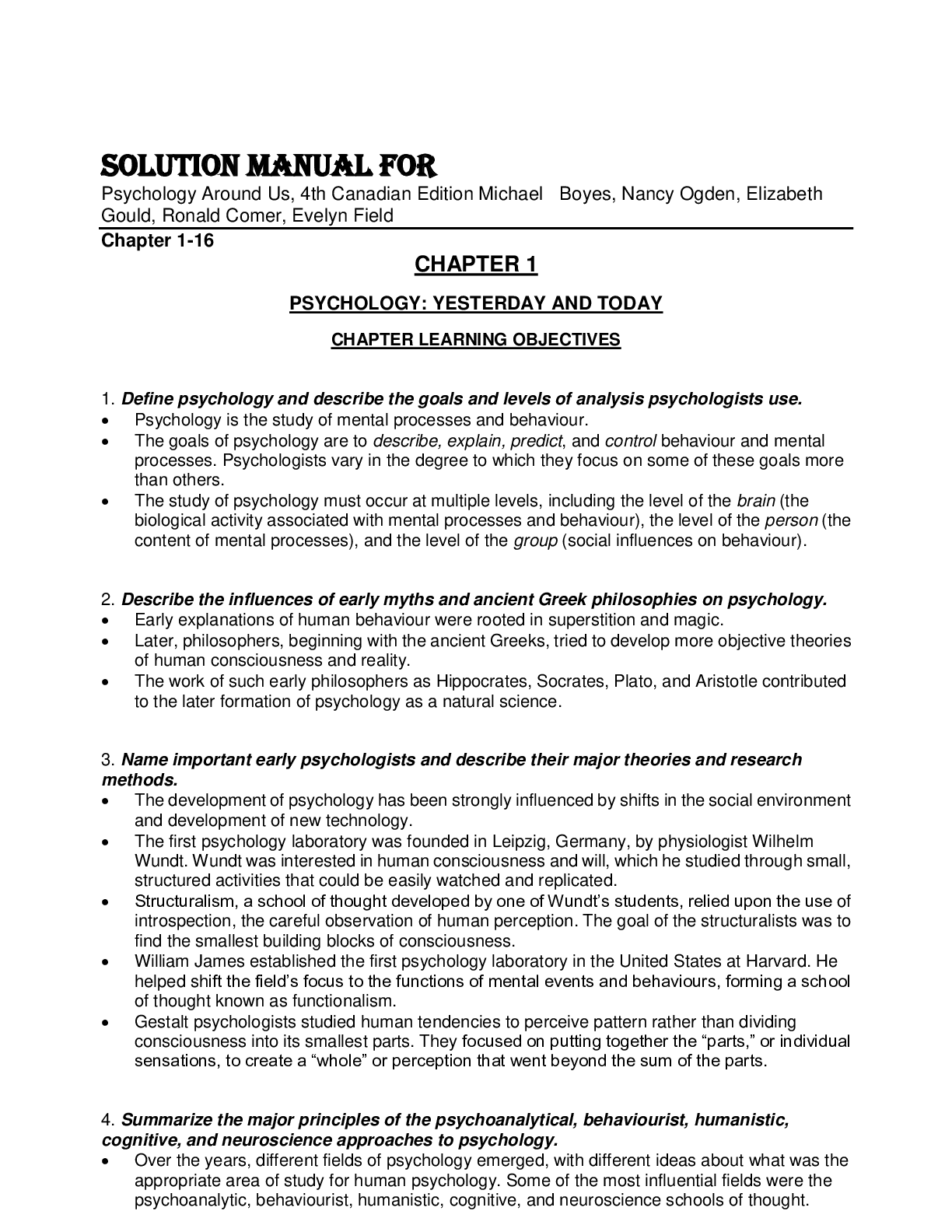Psychology > TEST BANKS > Psychology Around Us, 4th Canadian Edition by Ogden; Michael; Field; Ronald and Gould Test Bank (All)
Psychology Around Us, 4th Canadian Edition by Ogden; Michael; Field; Ronald and Gould Test Bank
Document Content and Description Below
CHAPTER 1 PSYCHOLOGY: YESTERDAY AND TODAY CHAPTER LEARNING OBJECTIVES 1. Define psychology and describe the goals and levels of analysis psychologists use. • Psychology is the study of mental pr... ocesses and behaviour. • The goals of psychology are to describe, explain, predict, and control behaviour and mental processes. Psychologists vary in the degree to which they focus on some of these goals more than others. • The study of psychology must occur at multiple levels, including the level of the brain (the biological activity associated with mental processes and behaviour), the level of the person (the content of mental processes), and the level of the group (social influences on behaviour). 2. Describe the influences of early myths and ancient Greek philosophies on psychology. • Early explanations of human behaviour were rooted in superstition and magic. • Later, philosophers, beginning with the ancient Greeks, tried to develop more objective theories of human consciousness and reality. • The work of such early philosophers as Hippocrates, Socrates, Plato, and Aristotle contributed to the later formation of psychology as a natural science. 3. Name important early psychologists and describe their major theories and research methods. • The development of psychology has been strongly influenced by shifts in the social environment and development of new technology. • The first psychology laboratory was founded in Leipzig, Germany, by physiologist Wilhelm Wundt. Wundt was interested in human consciousness and will, which he studied through small, structured activities that could be easily watched and replicated. • Structuralism, a school of thought developed by one of Wundt’s students, relied upon the use of introspection, the careful observation of human perception. The goal of the structuralists was to find the smallest building blocks of consciousness. • William James established the first psychology laboratory in the United States at Harvard. He helped shift the field’s focus to the functions of mental events and behaviours, forming a school of thought known as functionalism. • Gestalt psychologists studied human tendencies to perceive pattern rather than dividing consciousness into its smallest parts. They focused on putting together the “parts,” or individual sensations, to create a “whole” or perception that went beyond the sum of the parts. 4. Summarize the major principles of the psychoanalytical, behaviourist, humanistic, cognitive, and neuroscience approaches to psychology. • Over the years, different fields of psychology emerged, with different ideas about what was the appropriate area of study for human psychology. Some of the most influential fields [Show More]
Last updated: 8 months ago
Preview 1 out of 2430 pages

Buy this document to get the full access instantly
Instant Download Access after purchase
Buy NowInstant download
We Accept:

Reviews( 0 )
$35.00
Can't find what you want? Try our AI powered Search
Document information
Connected school, study & course
About the document
Uploaded On
Dec 12, 2024
Number of pages
2430
Written in
Additional information
This document has been written for:
Uploaded
Dec 12, 2024
Downloads
0
Views
371

















